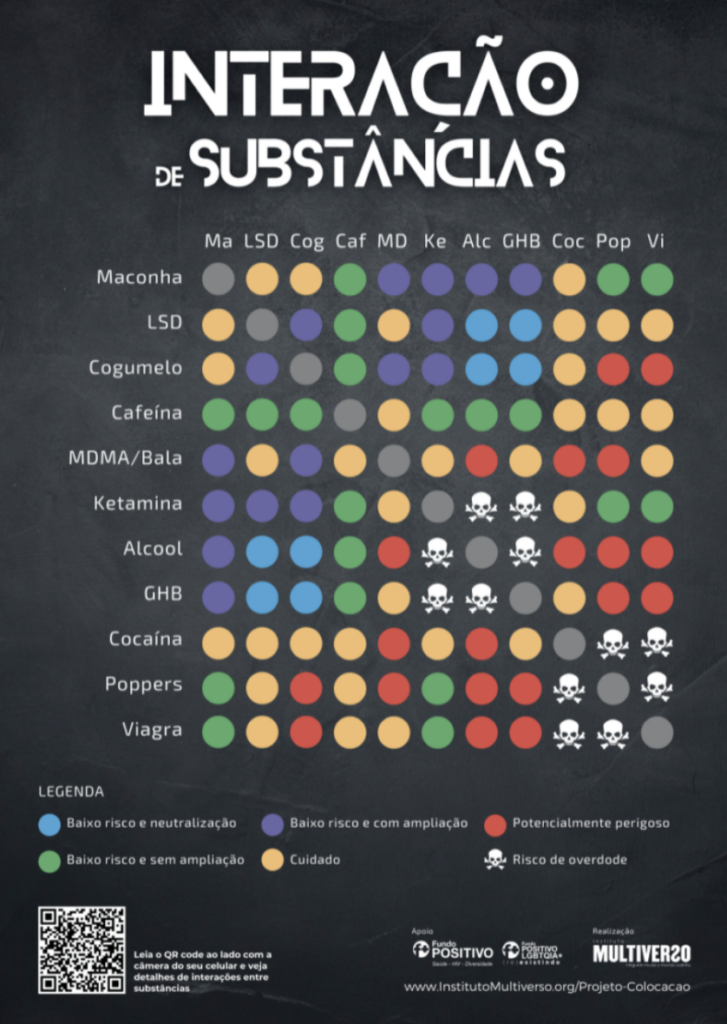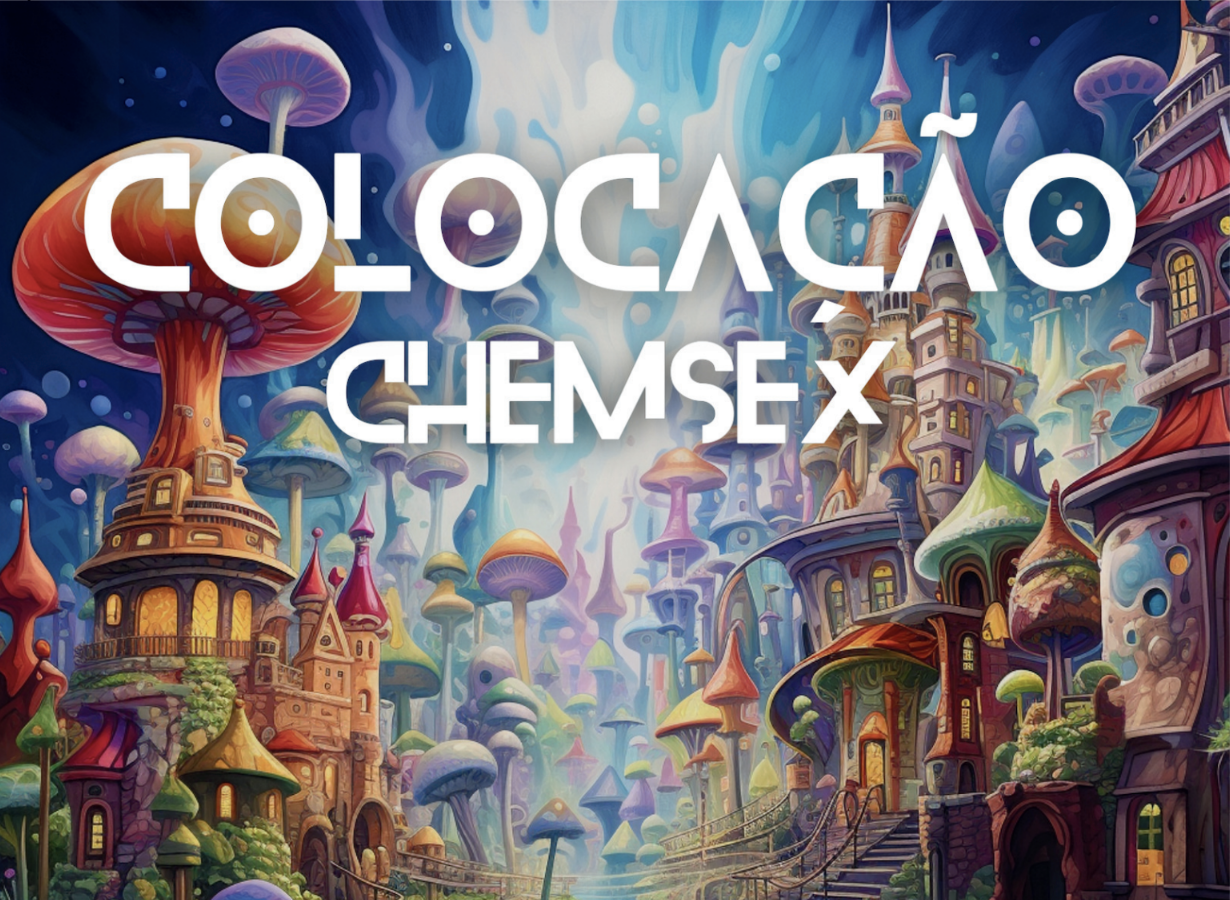During the pandemic, public health researchers in São Paulo began noticing what seemed to be an increase in the popularity of chemsex. The term refers to the practice and surrounding culture of sex parties among queer drug users—typically men who have sex with men, who use methamphetamine, mephedrone or GHB.
Media coverage of the subject has been dominated by misinformation and fearmongering, and there was a lack of educational resources that provided accurate harm reduction information and didn’t moralize or stigmatize. The chemsex harm reduction education that did exist was concentrated in urban areas, like the São Paulo-Rio axis.
Few resources were being aimed at the peripheries, the term used in Brazil to refer to neighborhoods that exist on the fringes not necessarily in a geographic sense, but in a socioeconomic sense. Many peripheries are on the outskirts of big cities, but many are in city centers.
In August, with funding from São Paulo-based Instituto Multiverso, they launched ColocAÇÃO, Brazil’s first chemsex harm reduction project. The project is aimed in particular at peripheries in São Paulo’s city center and those in Capão Redondo, a favela on the southern outskirts.
The project facilitates in-person services like peer-led harm reduction trainings and workshops. It’s also produced educational materials, like a primer that explains drug effects and interactions and a chatbot that answers questions about safe sex practices.
All resources and services have been designed with respect to the regional vernacular used by their target populations. The team does, however, hope that by making all the educational materials available online, they can begin reaching people in other part of the country as well. Their goal is not only to create resources for local communities, but to encourage others in the public health field to launch their own projects, and bring chemsex harm reduction discussions to the policy level.
Filter spoke with several of ColocAÇÃO’s creators, including Myro Rolim and Fabi Mesquita. This interview has been translated from Portuguese, as well as edited for brevity and clarity.
“[Chemsex] has been happening for some time, but people didn’t call it chemsex.”
Felipe Neis Araujo: What’s the history of chemsex in Brazil, specifically in the peripheries?
Myro Rolim: We have to ask if even the term “chemsex” makes sense here. In the peripheries, the term most used by people is colocação [placement, in Portuguese]. Chemsex as a specific concept refers to the use of substances to enhance sexual activity and as a social lubricant. When we look at substance use for that context in Brazil, we see that this has been happening for some time, but people didn’t call it chemsex. People see that they are [already] practicing chemsex when it begins to appear in the Brazil media, but there was already a previous practice of using some substances related to sex.
Fabi Mesquita: There is the colonial, imported idea that chemsex is a middle-class thing. It is necessary to recognize, however, that chemsex is a widespread practice among the populace in Brazil. It happens in the periphery, and it is necessary to create services and strategies for care, prevention and assistance for people there, and not just in middle- and upper-class neighborhoods.

What drugs are popular in local chemsex scenes, and how does this change along class lines?
Rolim: Mephedrone is very rare for us to find here in the chemsex context. Ketamine use is not strongly associated with chemsex in many countries, but in Brazil it is. Methamphetamine is quite present. Previously it was used by wealthy people, as it was very expensive, but in recent years it has become cheap and easily accessible. There is good quality and bad quality, but meth is circulating in our market and being used by people from different social classes. Viagra and Cialis, two legal drugs, are substances strongly related to Brazil’s chemsex scene.
Brazil is a country with a very marked division of social classes, and this has implications for access to information and harm reduction. White, university-educated, middle-class people have more access to information, services and good-quality drugs.
And since substance use everywhere is shaped by local realities, we enter the discussion of decolonization. We cannot guide our harm reduction strategies by importing those developed in countries like England, Germany or France.
“We [chose] a population for whom good information is not available. For whom the state does not care.”
What are the particular needs of LGBTQ drug users in Capão Redondo and the city center that made you decide to focus the project there?
Mesquita: We know that harm reduction work takes place at raves and luxury clubs. We wanted to target a population for whom good information is not available, for whom care strategies and services are not easily accessible. For whom the state does not care.
We chose a periphery where we know that there are a series of parties and activities and cultural manifestations where there is this type of substance use associated with sexual practices. And we first focused on the city center which, although geographically central, is socially marginalized, right? It is the abandoned old city center. So it’s not just in the periphery that we work, but in places where vulnerable people live.
We believe that there is no community that is [inherently] vulnerable, right? It is the result of an entire political and economic social construction that has the interest of marginalizing [certain] people. So why do you have harm reduction services at a luxury rave and you don’t have it in Capão Redondo?
Rolim: Brazil is a country that supports and promotes the drug war, which criminalizes people who use illicit drugs. If people do not have access to this type of unbiased, non-judgemental information, the information they will have is the information promoted by the mainstream media, [which] imports European and American perspectives on chemsex and promotes panic. We want to encourage people who practice chemsex to think “I will practice it, but I will try to take care of myself before, during and after.”
“The federal government remains very close to therapeutic communities. This is a nightmare.”
What could the state be doing to make chemsex harm reduction resources and services more accessible?
Mesquita: Firstly, they must democratize access to funds, [so that] funding opportunities are not aberrations. In Brazil, the government wants organizations to have at least five years of experience in providing services to be eligible for funding. How many organizations in Brazil survive for five years without funding?
Oh, but we don’t have loads of funds. Ok, but they could, for instance, support access to the materials that are already available. The harm reduction education material produced by Multiverso—go put a government brand on it, make a million copies and distribute them. If they helped us spread the production and distribution of this material, we would be able to have an infinitely greater reach.
Another very important point that must be addressed is that municipal and state governments need to bring harm reduction back to their health policies. The dismantling of harm reduction has further impacted HIV/AIDS policies. [We must] invest in training public health workers, because we see that these workers are not prepared to deal with issues related to drug use.
We expected that the harm reduction agenda would immediately return to the federal government’s agenda in President Lula’s new term. This did not happen, which was a huge disappointment among all organizations working on drug issues. Instead, the current government remains very close to therapeutic communities, despite all the evidence of violence committed by these institutions. It created a department of therapeutic communities, increased money for therapeutic communities and created a day to celebrate therapeutic communities. This is a nightmare.
Graphics courtesy of Instituto Multiverso





Show Comments